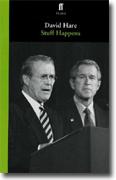Stuff Happens
David Hare
book reviews:
· general fiction
· chick lit/romance
· sci-fi/fantasy
· graphic novels
· nonfiction
· audio books
· author interviews
· children's books @
curledupkids.com
· DVD reviews @
curledupdvd.com
newsletter
win books
buy online
links
home
for authors
& publishers
for reviewers

 |
Stuff Happens: A Play David Hare Faber & Faber Paperback 128 pages October 2005 |
|
Click here to read reviewer Luan Gaines' take on Stuff Happens: A Play. Stuff Happens is a rare beast: a contemporary history play. It is a pithy and compelling account of the genesis of the second Iraq war. The principal characters are drawn from the Bush administration. The scenes consist of the events of recent history. Nothing has been invented. When the politicians address the press or the public, their words are taken from documentary sources. When they retire behind closed doors, David Hare provides the dialogue, but the tenor of what is said is true to the facts.
In fact, Hare succeeds where many political pundits have blundered because he resists the temptation of the big idea. This war, as he presents it, is not about oil, faulty intelligence, geo-politics, or any combination of such factors, so much as it is about moral fallibility—most of all it is about our willingness to believe whatever suits us best. As you might expect, the man found to be most at fault is the president. But when the play was first performed, it came as a surprise to many that the character of George W. Bush should be something of a revelation. This president is not the bumbling rich kid or gung-ho cowboy of left-wing satire. He is a man whose lack of words makes him an enigma, whose brevity of style is a powerful tool. In conference, we see him turn to Cheney, Rumsfeld, or, most often, “Condi”, and permit them to speak. They then present their take on what they believe is going on in the mind of the commander-in-chief. He stays out of the fray. When his appointees have fought things out among themselves, he makes his decision. “He’s a tricky one,” observes the more eloquent and open Blair. Bush’s reluctance to enter into debate gives him strength. This man is definitely not Cheney’s puppet. But his taciturnity is also the cause of disaster. Once it becomes clear that Bush has decided on war, then there is a powerful incentive for those around him to find a rationale for the coming conflict that they can live with. After all, they can’t dissuade this man. As Swift’s wonderful aphorism puts it, which is attached as an epigraph to the play: “It is useless to attempt to reason a man out of a thing he was never reasoned into.” What we see unfold is the operation of a simple and deadly syllogism: a war is on its way; therefore there must be a good reason for war. If that sounds too absurd to you, then just cast your mind back to 2002. Didn’t you hear then people say privately that there was a more complex or pressing case for war than the one being propounded by Bush and Blair to their electorates? We just weren’t getting the full story. Well, it turned out that there was no such argument. Not only that, but the guys pulling the strings were as prone to suggestion as everyone else. They too couldn’t bring themselves to imagine that there might not have a just cause, so like us they went looking for one. There is a brief scene in 10 Downing Street that neatly captures the way that momentum gathered on the road to Baghdad. Blair and his advisors have read the dossier on Iraqi WMDs that they commissioned. They are disappointed by the lack of evidence. A call goes out to British intelligence that more information is urgently needed. Within twenty-four hours, the head of MI6 is on Blair’s doorstep to deliver just that golden nugget of reputed fact. Blair and his associates weigh up the risks of including a very contentious claim against their desire to side strongly with the US. “It’s an instinct, isn’t it?” says Blair. “It’s a feeling.” Instincts. Feelings. And behind them motives that are unclear even to the man who acts upon them. These are the forces of history as much as trade and oil are. That is why a playwright like David Hare can qualify as an excellent historian. Originally published on Curled Up With A Good Book at www.curledup.com. © Mark Martin, 2006 |
|
|
|
 Click here to learn more about this month's sponsor! |
|
| fiction · sf/f · comic books · nonfiction · audio newsletter · free book contest · buy books online review index · links · · authors & publishers reviewers |
|
| site by ELBO Computing Resources, Inc. | |
 Knowing that much, an intelligent skeptic might wonder whether a dramatist could have anything substantive to add to the mountain of analysis already in print. The concept of this play, particularly as it is the product of a renowned left-wing English playwright, will lead some to expect an exercise in propaganda. But such skeptics are wrong in their assumptions. Stuff Happens is much more than a way to sugar the pill of political history for a complacent audience. Nor is its anti-war stance in any way reflexive or predictable.
Knowing that much, an intelligent skeptic might wonder whether a dramatist could have anything substantive to add to the mountain of analysis already in print. The concept of this play, particularly as it is the product of a renowned left-wing English playwright, will lead some to expect an exercise in propaganda. But such skeptics are wrong in their assumptions. Stuff Happens is much more than a way to sugar the pill of political history for a complacent audience. Nor is its anti-war stance in any way reflexive or predictable.